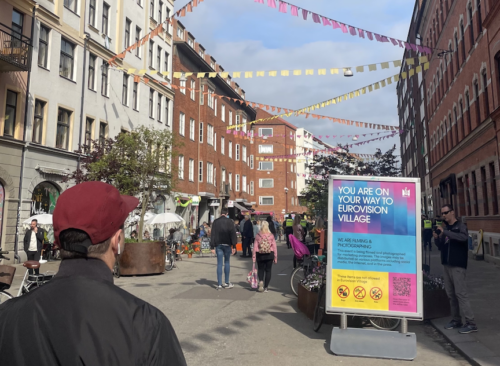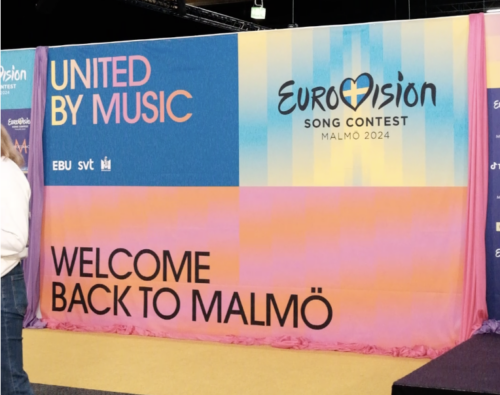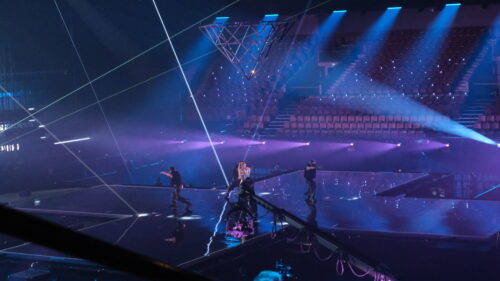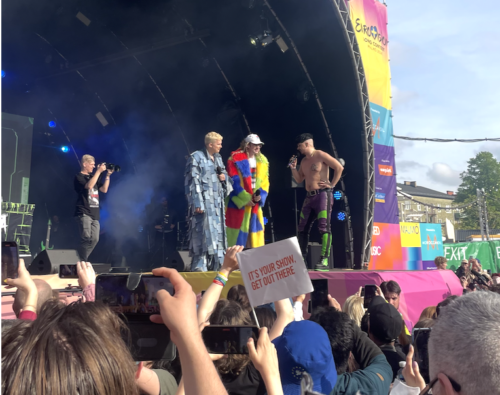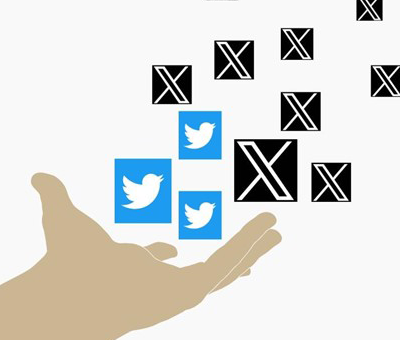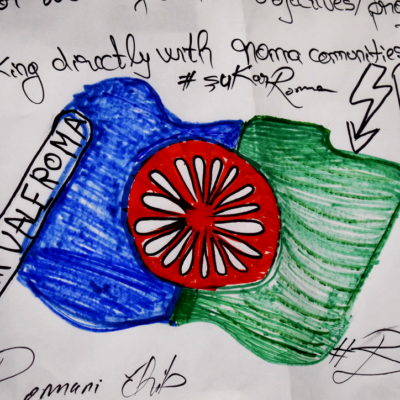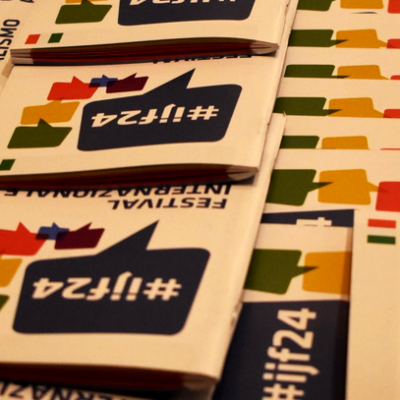For two days, I lived, breathed and absorbed everything Eurovision as a student journalist in the ESC press-room. As the world’s biggest music competition, it’s time for you to get your accreditation and up your portfolio by entering their media room.
Not sure where to start from? We’ll walk you through it.
Our experience at Eurovision
Starting with applying for accreditation, the applications open about two months prior to the contest finale – so make sure to keep an eye on the website for updates and opportunities. When arriving at the media for the first time, we pick up our press card, and are immediately routed through the press room, into the first dress-rehearsal for the Eurovision Grand Final.
Aside from the overall excitement of being in the same stadium as a potential ESC winner, experiencing their music live, and sitting next to world famous journalists – the true drama arrives once we get the notification of Joost Klein’s block from rehearsal due to an ongoing investigation. Immediately, the entire audience kicks off. Cameras are rolling, mics are being checked, laptops are out with keyboards clicking and frantic whispers shuffle across the crowd. As a student journalist, it is incredibly impressive to watch these powerhouses steam through their work – which only lasts for a couple of minutes, until we return to watching the show. We get back into the media room after the show, and that’s where the real work begins.
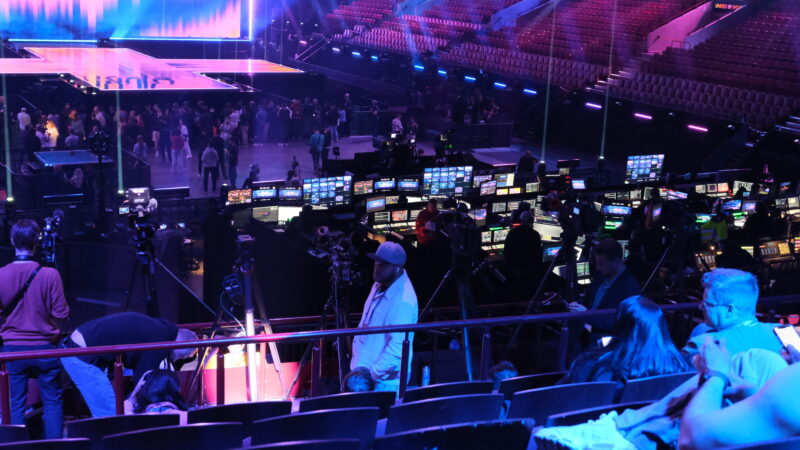
Being a student journalist in the media room
The media room is essentially a massive hall, with work stations, radio rooms, and broadcasting screens readily equipped for you to use. The work stations are split into two, one for General Media (that’s us), and one for Fan Accredited Media (fan accounts dedicated to Eurovision). While we’re busy at work, the Fan Media look like they’re having the time of their lives creating TikToks, reels, stories and just going along with the vibe in general. I can’t help but be a little jealous.
Be ready for song contest artists to randomly pop up in the media room, accepting interviews for a couple of minutes, before disappearing off into the delegation rooms again. Aside from focusing on your work, you’ll also want to keep checking for groups of journalists crowding in any areas – that’s your sign that Europe’s potential next superstar is in the room with you.
On the finale day, the media room is chaotic. There are influencers everywhere, documenting every single detail, journalists are furiously hammering at their keyboards, and there’ll be you, waiting in anticipation to find out which country is taking home the trophy this year. When the finale starts up, the focused ambience gets more intense – but, of course, with breaks to dance and drink along to your favourite song.
The hall erupts into cheers when Switzerland is crowned this year’s winner (albeit, some silence from the Croatian media table), which quickly turns into broadcasting and documenting the victory (or loss) to their audiences. While Nemo’s press conference is taking place, most of the other country’s representatives pool out into the media room to chat with us.
And our work is done! If you’re attending Eurovision next year, we wish you the best of luck with using public transport to get home. Post-Eurovision rush hour is no joke.
What should you expect?
First of all, make sure to dissect their Media Handbook, word by word, before getting there. Every detail is important and could result in revoking your press access. Don’t do what we did by investing in a top-notch wireless audio recording kit, before finding out that wireless equipment is strictly banned on premises.
Speaking of equipment, be sure to pack your own camera, microphone, and tripod – with all the artists strolling around the media room, you’ll need to be ready to catch them while you can.
Be prepared for an absolute frenzy. Journalists will constantly be running around, filming, writing, interviewing, and filling up the cafeteria queue for their millionth coffee of the day.
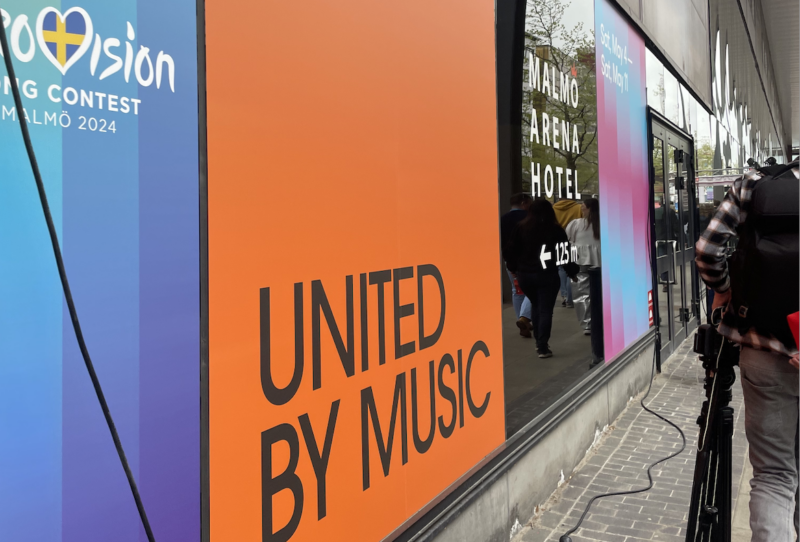
Eurovision could be the place for you
Not to state the obvious, but the networking opportunities are everywhere here. From top music journalists to fan media entities, your foot will be well in the door as soon as you step into the media room.
We managed to meet Ville Vedenpää, a culture journalist from YLE, the national Finnish broadcasting company, whose record of 17 Eurovision coverages gave us massive insight into the overall experience of being there. With his first time being at Eurovision in 2006 (when Finland won, he certainly chose the right time to make a debut), he’s said that the Eurovision media room is “a good place to experience something special”. He adds on that “young journalists can really learn what is happening on a bigger scale”. Take it from him!
This is also an excellent opportunity to boost your portfolio. You’ve covered Eurovision, you’re capable of anything now. Aside from all that professional nattering, you’ll be able to soak up Europe’s best music in the live dress rehearsals and experience the best the hosting country has to offer. Malmö has gone all out in decorating their city for the event, so naturally, the first thing we do is head out for some kebab pizza and to explore the city.
Putting the ‘student’ in ‘student-journalist’
It does come with its downsides though. Sort of.
As with any journalistic experience, it can be overwhelming. You may not know anyone there, be unsure what exactly you have to do, and the hyper-specific media rules could definitely take a toll on you. Our resolution to this? Put yourself out there. Don’t be afraid to talk to the other journalists in the room, they all started from scratch – just like you. Another pro-tip is to talk to the fan accredited media. They’re usually social media influencers, which will help remove the pressure of interacting with the “intimidating” pro journalists.
If you’re headed to Eurovision alone, you’ll have to figure out everything by yourself. The media room is certainly accommodating, but as an independent journalist you must rely on yourself.
After speaking to Jonathan Hendrickx, an academic who focuses on Eurovision and who also happens to be an Executive Board Member of European Youth Press, some light has been shed on the inclusivity of the media room. “I think the press room could be more inclusive towards young journalists.” Adding on that “It is pretty difficult to get in touch with the organization, the delegations, and so on and so forth. Maybe some more guidance for those early career journalists could be beneficial.”
Considering I am still waiting for a response to my delegation area access request, he may have a point.
So… should you go?
Short answer? Yes.
Long answer? Yes, but be prepared mentally. No amount of planning will ready you for the mayhem that ensues in the media room, nor the panic of accidentally crashing into one of the top 5 artists outside the media room (as I not-so subtlely did with Ireland’s entry, Bambie Thug).
Will we be seeing you in the press room next year?
See more from my time at Eurovision 2024 in Malmö in Orange Magazine’s Instagram story highlights.
Featured image photo by Alice Milne
